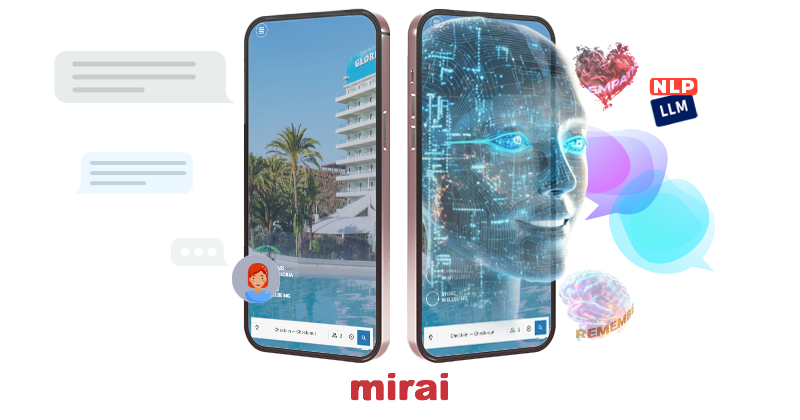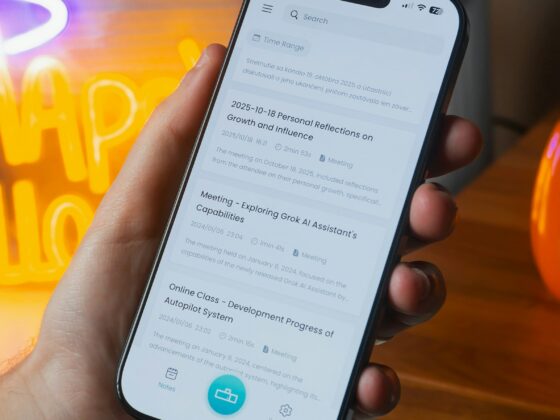En español, en français, em português.
For years, chatbots have been the entry point to automated customer interaction. They were useful, predictable, and cost-effective. But they were also rigid, limited, and often frustrating. Today, a new generation of AI agents is emerging and they represent a clear evolution in how businesses and users will connect.
AI is changing guest behavior and users’ expectations are already shifting dramatically. The rise of AI agents is the natural response to this new reality, moving hotels from simple automation to true intelligence.

Traditional chatbots vs. AI agents
The differences between the two are not just incremental. They are transformational:
- Technology. Chatbots rely on fixed rules and decision trees. AI agents use new technology powered by advanced large language models (LLMs) and natural language processing (NLP) to understand and respond in context.
- Conversation. Where chatbots feel guided and mechanical, AI agents engage in fluid, natural dialogue.
- Understanding. Traditional systems depend on keywords. Agents grasp real meaning and nuance.
- Context. Chatbots treat every interaction as isolated. AI agents remember and build on past exchanges, making conversations coherent and personalized.
- Reasoning and memory. Chatbots don’t reason or remember. AI agents connect dots, recall history, and adapt over time.
- Voice. Chatbots were never designed for natural voice interactions. AI agents, however, are increasingly capable of holding real-time, human-like conversations through voice, opening the door to new use cases in customer service and beyond.
- Empathy. Chatbots deliver scripted replies with no emotional intelligence. AI agents can simulate empathy—modulating tone, adapting responses, and making users feel understood—an essential element for voice-based customer service.
- AI concierge. Chatbots were mostly limited to pre-stay questions or FAQs. AI agents, thanks to their contextual memory and ability to act, can also assist during the guest’s stay—handling service requests, providing personalized recommendations, or even acting as a digital concierge available 24/7.
- Scalability and experience. Traditional chatbots work with fixed scripts. When questions become more varied or complex, they fall short and give repetitive answers, which frustrates users. AI agents, on the other hand, understand context and adapt naturally, so they can handle more people without losing quality in the experience.
- Proactivity. Chatbots react to inputs. AI agents anticipate needs and proactively recommend.
- Learning and evolution. Chatbots are static. AI agents improve with use and are moving toward the role of true digital assistants.
Chatbots provided value at the time. They automated repetitive interactions and gave companies a first step into digital assistance. But today, their limits are evident, and they no longer meet customer expectations. AI agents represent the next stage of that evolution: more capable, empathetic, and integrated. The time for traditional chatbots has passed. The future belongs to AI agents.
In short, chatbots belong to the era of automation, while AI agents belong to the era of intelligence.
The future of digital interaction
The shift from chatbots to AI agents is not about replacing one tool with another. It is about redefining the relationship between people and technology. As organizations adopt AI agents, interactions become more natural, more human-like, and ultimately more valuable.
A key part of this future is agentic AI. These are systems that don’t just talk, but also act. Unlike chatbots, which are confined to conversation, AI agents can take autonomous action: booking an appointment, generating a report, or connecting with other software to execute tasks on behalf of the user. This level of autonomy may sound futuristic, but it is already much closer than many realize. OpenAI has just launched Agentic Commerce Protocol or ACP to turn chats into checkout processes.
However, one of the most debated scenarios is whether AI agents will truly succeed in managing end-to-end hotel transactions—from search to booking. At Mirai, we believe this vision remains distant, not due to technical limitations but because of adoption barriers. Travelers still value control, transparency, and trust throughout the booking process. Today’s booking systems are already simple, fast, and highly convenient. The value proposition of agentic AI has yet to prove strong enough to replace them. For now, we see the real opportunities in the exploratory, service, and in-stay phases—where AI can guide, inform, and support guests with intelligence and empathy.
Considerations and risks of AI agents
As with any new technology, AI agents come with challenges that businesses must take seriously. While they represent a clear leap forward from traditional chatbots, there are risks and limitations to manage:
- Hallucinations. Because AI agents are powered by generative AI, they can sometimes “hallucinate”—producing answers that sound convincing but are factually incorrect. This risk cannot be fully eliminated, as it is part of the nature of the technology. However, it can be significantly reduced by:
– Supplying the agent with high-quality, structured information and context.
– Limiting its scope of action to well-defined domains.
– Implementing monitoring and fallback systems that redirect to a human when uncertainty is detected.
- Overpromising. The capabilities of AI agents can sound almost too good to be true. It is important for businesses to set realistic expectations—focusing on areas where the technology already adds value (guidance, service, support) rather than pushing prematurely into areas where adoption is low or trust is critical.
- Continuous governance. Unlike static chatbots, AI agents evolve and learn. This means companies need to plan for ongoing oversight—regular reviews, fine-tuning, and updates—to ensure consistent performance and alignment with business goals.
- Privacy and compliance. By being more contextual and integrated, AI agents inevitably process more personal data. In strict regulatory environments like the EU, this raises new challenges around consent, transparency, and data governance. Choosing the right vendors and defining clear policies is essential to adopt AI responsibly without compromising compliance.
By recognizing these risks and taking proactive measures, organizations can embrace AI agents confidently—leveraging their transformative potential while keeping limitations in check.
Conclusion
AI agents are not a distant promise. They are already reshaping digital interaction today. For hotels, they represent an opportunity to enhance service, personalize conversations, and anticipate guest needs in ways that chatbots never could. Setting them up may sound complex, but with the right approach it is entirely achievable and highly rewarding. The question is no longer if this shift will happen, but how quickly each hotel will embrace it. Are you ready to lead this transformation?






